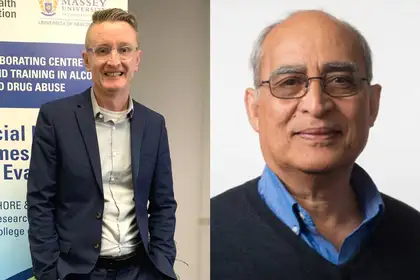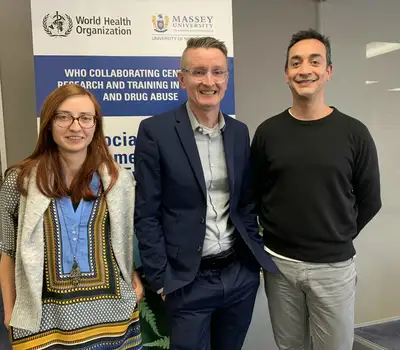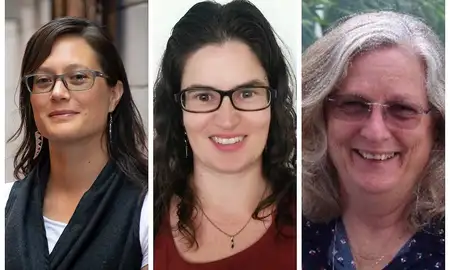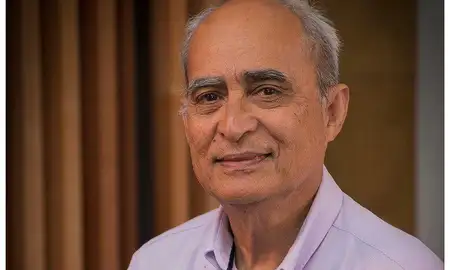
Associate Professor Chris Wilkins and Associate Professor Sunia Foliaki.
Their respective projects, regulating retail vaping to support smoking cessation, and advancing palliative care among Pacific children, have collectively been awarded over $2 million in funding over the next three years.
Massey’s Research Impact Advisor Dr Rahna Carusi says that both projects will provide vital research that will inform government policies and regulations in current development, as well as their potential funding directions.
“In terms of real-world impact, Dr Wilkins’ research will gather valuable information that supports Aotearoa’s Smokefree 2025 goal of reducing smoking prevalence and effects of smoking and vaping across our population. Dr Foliaki’s well-timed research will address a gap in our health sector related to a vulnerable population at a cultural and familial level and will lead to healthcare practice improvements as Aotearoa shifts over to Health New Zealand.
“Both research projects contribute to the global Sustainable Development Goals, with a focus on good health and well-being and reduced inequalities. We can anticipate that each project’s impact outcomes will continue long after they are completed.”
The grants awarded by HRC provide funding to projects that show the promise of innovative, impactful, and life-saving research, and provide support to researchers wanting to make significant change in their research fields.
Dr Chris Wilkins – SHORE & Whariki Research Centre, College of Health
Dr Wilkins has extensive research expertise in drug trends and markets, public health, and drug policy. Joined by a multidisciplinary team of experts in their respective fields, Dr Wilkins’ project will inform the policy responses to retail vaping in Aotearoa New Zealand, particularly within youth, Māori, and Pasifika, and provide research to guide the retail vaping regulatory work currently underway by the Ministry of Health.
While vaping products can play a role in reducing health harms for current tobacco smokers, they pose a risk to young non-smokers as a gateway to smoking by creating a nicotine dependence making regulation a necessity. Dr Wilkins says that while the government is seeking to regulate vape outlets and vaping products with this in mind, there’s currently only limited research to inform this work.
“The aim of the study is to support progress towards the Government’s goal of Smokefree 2025 by identifying regulatory and retail approaches that encourage current tobacco smokers to take up vaping with the aim of quitting, while simultaneously discouraging vaping by adolescents who have never smoked.”
The study will utilise cutting-edge virtual reality to simulate how smokers and non-smokers interact with vape products and retail outlets under existing and alternative regulatory settings. The virtual experiments will be completed by young people, Māori, Pasifika, older smokers, and non-smokers.
Dr Wilkins says he’s grateful to be awarded this funding as the research is important to inform the policy and regulatory response to nicotine dependency, and is of particular importance for Māori and Pasifika who are disproportionately represented in smoking statistics.
“While smoking rates in Aotearoa New Zealand have declined over recent decades, Māori are still almost twice as likely to smoke daily than the general population. This project is a truly multi-disciplinary, multi-institution study involving leading researchers in tobacco cessation, adolescent health, Māori health, and virtual reality simulation.”
Dr Wilkins will be joined by a team of experts including Massey academics Dr Marta Rychert, Dr Penelope Truman, Dr Geoff Kira, Dr Jose Romeo, Dr Alexander Schnack, as well as The University of Otago’s Professor Janet Hoek and Dr Jude Ball, Auckland’s University of Technology’s Associate Professor El-Shadan Tautolo, and two private consultants, Dr Anette Kira and Dr Stefania Mattea.

Left to right: Dr Marta Rychert, Dr Chris Wilkins, Dr Jose Romeo.
Dr Sunia Foliaki – Research Centre for Hauora and Health, College of Health
Dr Foliaki has been a driver of change through his significant research efforts, leading several studies around public health issues in Pacific communities. He previously received HRC funding for a number of Massey-led studies, looking at cancer epidemiology and other non-communicable disease conditions including asthma among Pacific children in the Pacific and in Aotearoa New Zealand.
Dr Foliaki’s focus for this research project is identifying the level of need for Paediatric Palliative Care (PPC) among Pacific children as well as identifying barriers and enablers. Dr Foliaki says the study findings will contribute to informing the development of equitable and culturally competent PPC service delivery policies for all tamariki and rangitahi in Aotearoa New Zealand, with an initial focus on those of Pacific descent.
“The ethnic and cultural aspect to effective access to PPC remains poorly understood, and a corresponding development of services to meet these needs are lacking. This is compounded by inadequate and out-dated data on the need for PPC and the burden of life-limiting illnesses in tamariki and rangitahi, particularly those of Pacific and Māori descent.”
Since 1998, the palliative care needs of tamariki and rangitahi in Aotearoa New Zealand have been recognised and acknowledged in the NZ Palliative Care strategy, however, Dr Foliaki says PPC has not kept pace with adult palliative care.
Dr Foliaki says the study builds on a previous HRC-funded study on palliative care for the adult Pacific population in Aotearoa New Zealand, which showed that Pacific people do not optimally benefit from hospice and palliative care services currently available.
“In part, this is due to a lack of awareness of the philosophy and practices of hospice and palliative care services, and partly due to current health services that are culturally orientated to autonomous and informed individuals.”
Dr Foliaki will be joined by a team of experts, including Massey academics Professor Jeroen Douwes, Professor Chris Cunningham, and Dr Hayley Denison. Other members of the team include Dr Ross Drake, a Paediatric Palliative Care & Pain Medicine Specialist and Clinical Lead of the Starship Children’s Hospital Paediatric Palliative Care Service, and Dr Salina Iupati, a Palliative Medicine consultant and senior clinical lecturer at Otago Wellington School of Medicine. Two other Pacific co-investigators in the team include MaxCare Medical Centre Nurse Specialist Veenita Rairi and Ms Telusila Vea of University of Auckland.
Related news
Three Massey academics awarded HRC funding to further research
Māori infant and maternal health, supporting vocational rehabilitation and developing a strangulation screening tool for first responders are three areas of research that have been recognised in the latest round of the Health Research Council of New Zealand Research Activation Grants.

Health researchers secure HRC funding for asthma among Pacific children
A Massey-led study has been awarded $971,541 by the Health Research Council of New Zealand (HRC) to explore the barriers to self-management of asthma in Pacific children.

Leading drug researcher appointed to Prime Minister’s advisory group on cannabis reform
Associate Professor Chris Wilkins has been invited to join the Prime Minister's Scientific Advisors Expert Committee on cannabis law reform.
